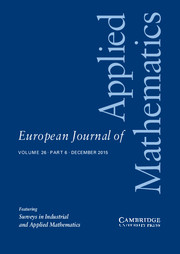Article contents
Strain in layered nanocrystals
Published online by Cambridge University Press: 01 October 2007
Abstract
Layered nanocrystals consist of a core of one material surrounded by a shell of a second material. We present computation of the atomistic strain energy density in a layered nanocrystal, using an idealised model with a simple cubic lattice and harmonic interatomic potentials. These computations show that there is a critical size r*s for the shell thickness rs at which the energy density has a maximum. This critical size is roughly independent of the geometry and material parameters of the system. Interestingly, this critical size agrees with the shell thickness at which the quantum yield has a maximum, as observed in several systems and thus leads one to support the hypothesis that maximal quantum yield is strongly correlated with maximal elastic energy density.
Information
- Type
- Papers
- Information
- Copyright
- Copyright © Cambridge University Press 2007
References
- 1
- Cited by

